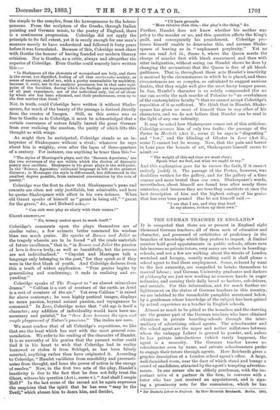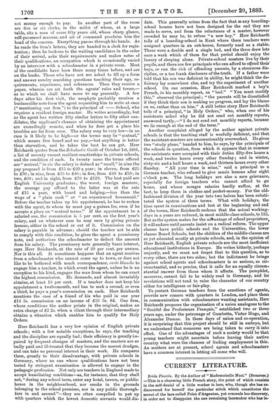THE GERMAN TEACHER IN ENGLAND.* IT is computed that there
are at present in England eight thousand German teachers, all of them men of education and character, and possessed of certificates of proficiency in the branches of knowledge which they profess to impart. A limited number hold good appointments in public schools, others earn fair incomes as private tutors, very many are ushers in boarding- schools, and not a few are walking about the streets of London wretched and hungry, wearily waiting until it shall please a school agent to find them employment. Some, reduced by want to the last extremity, are compelled to betake themselves to manual labour ; and German University graduates and doctors of philosophy are just now working as common hands in sugar refineries, and earning their daily bread as barbers, cab-drivers, and menials. For this information, and for much further en- lightenment on the status of German teachers in this country, we are indebted to the remarkable pamphlet mentioned below, by a- gentleman whose knowledge of the subject has been gained by actual experience as a teacher in English schools.
Almost as much to be pitied as the homeless and the starving are the greater part of the German teachers who have obtained situations in private boarding-schools through the inter- mediary of advertising school agents. The schoolmaster and the school agent are the upper and nether millstones between whom the unhappy Lehrer is ground to powder, and, unless he has private introductions (which rarely happens), the agent is a necessity. The German teacher knows no schoolmaster even by name, and private schoolmasters prefer to engage their tutors through agents. Herr Reichardt gives a graphic description of a London school agent's office. A large, well-furnished room, near the door of which stand and lounge a crowd of candidates, attracted by the agent's tempting advertise- ments. In one corner sits an elderly gentleman, with the im- portant mien of a partner in the firm, in converse with a tutor who has just received an appointment, and is sign- ing a promissory note for the commission, which be has * Der Deutsche Lehrer in England. By Herr Heinrich Reichardt. Berlin. 1883.
not money enough to pay. In another part of the room are five or six clerks, in the midst of whom, at a large table, sits a man of some fifty years old, whose sharp glance, self-possessed manner, and air of command proclaim him the head of the concern. Everything passes through his hands. As he reads the firm's letters, they are handed to a clerk for regis- tration ; then he beckons to the waiting candidates in the order of their arrival, asks their requirements and makes notes of their qualifications, an occupation which is occasionally varied by an interview with a schoolmaster in a private room. Most of the candidates have been there many times before, and are on the books. Those who have not are asked to fill up a form
and answer sundry searching questions touching their age, re- quirements, experience, and references. Then they receive a paper, wherein are set forth the agents' rules and terms,— as to which we shall have more to say presently. A few days after his first visit, the neophyte probably receives a businesslike note from the agent requesting him to write at once (" mentioning our firm ") to the principal of — School, who requires a resident foreign master. He writes accordingly, but as the agent has written fifty similar letters to fifty other can- didates, the applicant's chances of obtaining the appointment are exceedingly remote, and when he does get a place his troubles are far from over. The salary may be very low—in no case is it likely to be high—or the terms may be "mutual," which means free board and no pay,—but anything is better than starvation, and he takes the best he can get. Herr Reichardt quotes from the Scholastic Guide of October 1st, 1881, a list of seventy vacant resident-masterships in private schools, and the condition of each. In twenty cases the terms offered are " mutual," in six the salary is defined as " small," in nine the pay proposed is from £15 to £20 a year; in eleven, from £25 to £30 ; in nine, from £35 to 240 ; in five, from £40 to £50; in two, £60; and in eight, from £70 to £120. The best paid are English University graduates ; the worst, foreign masters; the average pay offered to the latter was at the rate of £15 a year, with board and lodging,—less than the wage of a " plain cook " or " an experienced housemaid." Before the teacher takes np his appointment, he has to reckon with the agent, to whom he must pay a guinea fee, even if he accepts a place on " mutual terms." If the appointment be a salaried one, the commission is 5 per cent, on the first year's salary, and on whatever sum he may earn by giving private lessons, either in the school or out of it. Commission on the salary is payable in advance ; should the teacher not be able to comply with this condition, he gives the agent a promissory note, and authorises the schoolmaster to deduct the amount from his salary. The promissory note generally bears interest, says Herr Reichardt, at the rate of 20 per cent. per annum. Nor is this all. It sometimes happens that an agent receives from a schoolmaster who cannot come up to town, or does not like to be bothered with much correspondence, carte blanche to engage him a teacher, in which event the agent, unless he is an exception to his kind, engages the man from whom he can exact the highest commission. He demands, and almost invariably obtains, at least 10 per cent. If a teacher does not keep his appointment a twelvemonth, and has to seek a second, or even a third, he pays a year's commission on each. Herr Reichardt mentions the case of a friend of his who paid in one year £16 3s. commission on an income of £53 3s. 8d. One firm, whose conditions the author prints in the original, makes an extra charge of £2 2s. when a client through their intermediary obtains a situation which enables him to qualify for Holy Orders.
Herr Reichardt has a very low opinion of English private schools ; with a few notable exceptions, he says, the teaching and the discipline are equally bad ; their efficiency is greatly im- paired by frequent changes of masters, and the masters aro so badly paid and ill-treated that they become the merest drudges, and can take no personal interest in their work. He compares them, greatly to their disadvantage, with private schools in Germany, where no one whose qualifications have not been tested by stringent examination is allowed to engage in the pedagogic profession. Not only are teachers in England made to accept humiliating conditions—as, for instance, that they shall not, "during any school term, enter any hotel, tavern, or public- house in the neighbourhood, nor smoke in the grounds belonging to the school premises, nor in any public thorough- fare in and around "—they are often compelled to pat up with quarters which the lowest domestic servants would die-
dain. This generally arises from the fact that m any boarding- school houses have not been designed for the end they are made to serve, and from the reluctance of a master, however crowded he may be, to refuse "a new boy." Herr Reichardt tells of a boarding-school in Kent where three teachers were assigned quarters in an out-house, formerly used as a stable.
There were a double and a single bed, and the three drew lots once a week which of them for that period should enjoy the
luxury of sleeping alone. Private-school masters live by their pupils, and there are few principals who can afford to offend their boys, or run the risk of offending parents, by a strenuous dis- cipline, or a too frank disclosure of the truth. If a father were told that his son was deficient in ability, he might think the de- ficiency lay somewhere else, and try the experiment of another school. On one occasion, Herr Reichardt marked a boy's French, in his monthly report, as "bad." "You must modify this," observed the principal ; " the parents will be dissatisfied if they think their son is making no progress, and lay the blame on us, rather than on him." A still better story Herr Reichardt tells of a principal, " in Holy Orders," who, when one of his assistants asked why he did not send out monthly reports, answered tartly,—" I do not send out monthly reports, because we lie enough at the end of the term."
Another complaint alleged by the author against private schools is that the teaching staff is woefully deficient, and that the assistant-masters are unconscionably overworked. He gives two "study plans," handed to him, he says, by the principals of the schools in question, from which it appears that in summer the assistants were occupied with their duties fifty-five hours a week, and twelve hours every other Sunday; and in winter, sixty-six and a half hours a week, and thirteen hours every other Sunday. " All your time is mine," said a principal to a German teacher, who refused to give music lessons after eight o'clock p.m. The long holidays are also a sore grievance, especially for foreign teachers who cannot afford to go home, and whose meagre salaries hardly suffice, at the best, to keep them in clothes and pocket-money. For the old- fashioned division of the year into two halves has been substi- tuted the system of three terms. What with holidays, the time spent in examinations and lost at the beginning and end of the terms, Herr Reichardt reckons that the actual working. days in a years are reduced, in most middle-class schools, to 135. But as the system makes for the aditantage of school proprietors, it will endure until parents insist on a radical reform. The upper classes have public schools and the Universities, the lower classes Board Schools, but the children of the middle-classes are as yet educated mostly at private schools, and, in the opinion of Herr Reichardt, English private schools are the most inefficient educational institutions in Europe. He writes bitterly, perhaps unjustly, and we must not forget that to this question, as to every other, there are two sides; but the indictment he brings against school agents and schoolmasters is so serious, so cir- cumstantial, and so precise, that it calls for an equally circum- stantial answer from those whom it affects. The pamphlet, moreover, cannot fail to be widely read in Germany, and its revelations will not tend to raise the character of our country either for intelligence or fair-play.
To protect German teachers from the exactions of agents, provide new comers with quarters in London, and place them in communication with schoolmasters wanting assistants, Herr Reichardt proposes the organisation of a union analogous to the "Societe des Profesteurs Francais," established two or three years ago, under the patronage of Gambetta, Victor Hugo, and Alexandre Dumas. In these days of union and co-operation, it is surprising that this project should be still in embryo, but we understand that measures are being taken to carry it into effect. One of the advantages of such a society would be that young teachers might ascertain before leaving their native country what were the chances of finding employment in this. As matters are at present, school agents and schoolmasters have a common interest in letting all come who will.



































 Previous page
Previous page